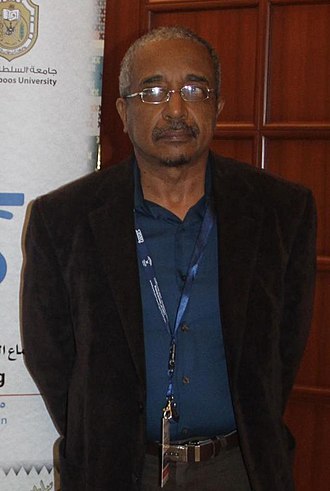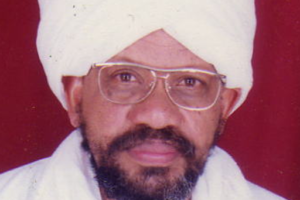
Professor Muntasir Eltayeb Ibrahim
- Date April 11, 2024

Muntaser Eltayeb Ibrahim, born on June 17, 1957, is a prominent Sudanese geneticist and professor of molecular biology at the University of Khartoum. Reputed as “one of Sudan’s most distinguished living scholars” by Science, Ibrahim’s research delves into human genetic diversity in Africa, particularly focusing on genetic variations contributing to susceptibility to infectious diseases such as malaria and leishmaniasis, as well as cancer genetics.
Ibrahim holds the title of founding member of the African Society of Human Genetics and co-founder of the Sudanese National Academy of Sciences (SNAS). Additionally, he is a distinguished member of The World Academy of Sciences. His extensive contributions to scientific literature include over 180 original peer-reviewed research publications, prominently featured in renowned journals like Science, Proceedings of the National Academy of Sciences, Nature, and Nature Genetics.
Born in Omdurman, Sudan, Ibrahim commenced his academic journey with a Bachelor of Science degree from Zagazig University in Egypt in 1980. He furthered his studies, obtaining a postgraduate diploma in Medical Entomology and Parasitology from Cairo University in 1982, followed by a Master of Science in Zoology from the University of Khartoum in 1987. Ibrahim concluded his formal education with a Ph.D. in molecular biology from the University of Copenhagen in 1994.
Throughout his career, Ibrahim’s academic positions have evolved, from serving as a Visiting Research Fellow at the University of Cambridge’s Department of Pathology (1997-1998) to his current role as a full professor at the University of Khartoum’s Institute of Endemic Diseases. He has also held leadership roles, including chairing the Institute of Endemic Diseases (IEND) and the Department of Molecular Biology in IEND of Genetic Diseases at the University of Khartoum.
Beyond academia, Ibrahim has played pivotal roles in shaping scientific organizations. He played a crucial role in establishing both the African Society of Human Genetics and the Sudanese National Academy of Sciences. Furthermore, his contributions extend to the international scientific community, as evidenced by his service on the council of advisors for the International Centre for Genetic Engineering and Biotechnology from 2004 to 2013.
Ibrahim’s research has significantly advanced our understanding of human genetic diversity in Sudan and Africa at large, shedding light on the interplay between genetics and disease susceptibility. Notably, his studies have elucidated the genetic underpinnings of diseases such as malaria, leishmaniasis, and cancer, including groundbreaking discoveries linking Epstein–Barr virus infection to breast cancer in Sudan.
Acknowledging his outstanding contributions, Ibrahim was honored with the C. N. R. Rao Prize for Scientific Research in 2014. This prestigious accolade recognizes individuals from Least Developed Countries who have made significant contributions to global science. Ibrahim’s fundamental insights into the role of human genetic variation in disease susceptibility garnered international acclaim, leading to his induction as a Fellow of The World Academy of Sciences in 2007.
Despite his accolades, Ibrahim faced adversity in 2019 when he was imprisoned after participating in non-violent protests advocating for political change in Sudan. His detainment sparked international outcry, with numerous organizations and colleagues calling for his release. Fortunately, Ibrahim was freed alongside other political prisoners following the 2019 Sudanese coup d’état, marking a victory for academic freedom and human rights.
In addition to his scientific endeavors, Ibrahim maintains a commitment to education, having supervised over 40 Masters and Ph.D. students. His legacy as a scientist and advocate for societal change continues to inspire future generations, reflecting his enduring impact on both scientific research and the promotion of social justice.
Selected publications:
- Convergent adaptation of human lactase persistence in Africa and Europe
- The genetic structure and history of Africans and African Americans
- Tocilizumab in patients admitted to hospital with COVID-19 (RECOVERY): a randomised, controlled, open-label, platform trial
- Y chromosome sequence variation and the history of human populations
- Resistance to cancer chemotherapy: failure in drug response from ADME to P-gp
- Genome-wide and fine-resolution association analysis of malaria in West Africa
- SLC11A1 (formerly NRAMP1) and disease resistance
- Aspirin in patients admitted to hospital with COVID-19 (RECOVERY): a randomised, controlled, open-label, platform trial
- Autoclaved Leishmania major vaccine for prevention of visceral leishmaniasis: a randomised, double-blind, BCG-controlled trial in Sudan
- Glycolysis, tumor metabolism, cancer growth and dissemination. A new pH-based etiopathogenic perspective and therapeutic approach to an old cancer question
You may also like

Hassan Ahmed Elhag Baba

Prof. Suad M. Sulaiman

